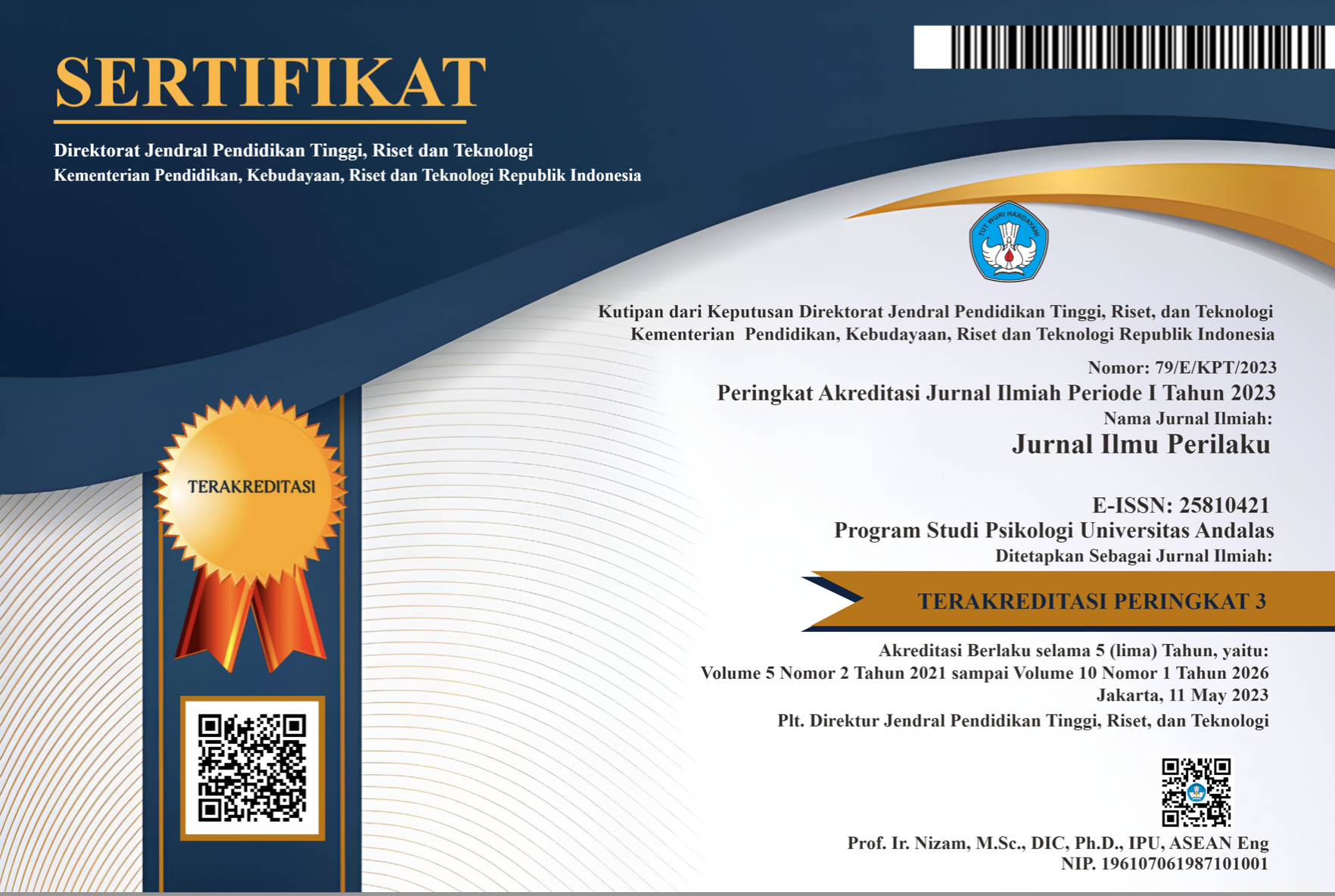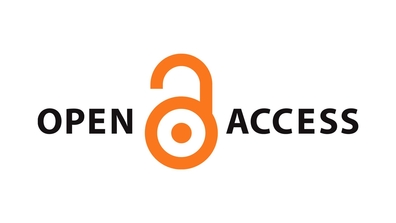Refleksi Kehidupan Ibu Tunggal yang Memiliki Anak Intellectual Disability
Abstract
Penelitian ini bertujuan untuk mengetahui bagaimana pemaknaan pengasuhan yang dimiliki oleh ibu tunggal, serta faktor yang dapat mempengaruhi pengasuhan pada anak yang mengalami intellectual disability. Metode penelitian yang digunakan adalah metode kualitatif dengan pendekatan fenomenologi. Partisipan utama penelitian berjumlah dua orang. Pengumpulan data menggunakan wawancara mendalam dan observasi. Pengujian kredibilitas penelitian menggunakan member checking, triangulasi sumber, dan deskripsi secara detail terkait partisipan penelitian. Hasil penelitian menunjukkan bahwa ibu tunggal yang mengasuh anak intellectual disability seorang diri, memaknai pengasuhan sebagai suatu titik balik kehidupan yang membantu ibu tunggal untuk menemukan kapasitas serta intensitas terbesar didalam diri mereka dalam menjalani kehidupan yang diperoleh melalui serangkaian perilaku yang bersifat evaluatif seperti refleksi diri, memahami kembali nilai hidup yang dimiliki dan menyadari otoritas dirinya dalam menjaga stabilitas keluarga dan pengasuan anak pasca ditinggal oleh suami. Selain itu, pandangan lingkungan sekitar terhadap kondisi anak juga dapat memunculkan pengaruh tertentu terhadap penerapan pengasuhan yang diberikan oleh ibu tunggal kepada anaknya.
Downloads
References
American Psychiatric Association. (2013). Diagnostic and statistical manual of mental disorder edition “DSM-5”. Washington, DC: American Psychiatric Publishing.
Andrawina, G.P. (2017). Pengasuhan keluarga single parent terhadap anak berkebutuhan khusus. Jurnal Komunitas, 6(1), 294-377.
Berns, R.M. (2013). Child, family, school, community socialization and support (Ninth Edition). Belmont : Wadsworth
Creswell, J.W. (2015). Penelitian kualitatif & desain riset: Memilih diantara lima pendekatan. (A.L. Lazuardi, Trans.). Yogyakarta: Pustaka Pelajar.
Diken, I.H. (2006). Turkish mothers’ interpretations of the disability of their children with mental retardation. International Journal of Special Education, 21(2), 8-17.
Ghani, F.A., Roeswardi, S.I., & Aziz, A.A. (2014). Parenting styles and their relation to teenangers’ personality profile in single mother families: A case study. Procedia-Social and Behavioral Sciences, 114, 766-770.
Hallahan, D.P., & Kauffman, J.M. (2006). Exceptional children: Introduction to special eductaion (10th edition). Boston: Pearson Education.
Haryanto, J. K., dkk. (2012). Transformasi dari tulang rusuk menjadi tulang punggung. Yogyakarta: CV. Arti Bumi Intaran.
Hastings, R.P., Allen, R., McDermott, K., & Still, D. (2002). Factor related to positive perceptions in mothers of children with intellectual disabilities. Journal of Applied Research in Intellectual Disabilities, 15, 269-275.
Heward, W.L. (2013). Exceptional children: An introduction to special education (10th edition). New Jersey: Pearson Education.
Holden, G.W. (2015). Parenting: A dynamic perspective (2th edition). Los Angeles: Sage Publication.
Howe, T.R. (2012). Marriage and families: In the 21st century a bioecological approach. Oxford: Weley-Blackwell
Kerig, P.K., Ludlow, A., & Wenar, C. (2012). Developmental Psychopatology. Berkshire: The McGraw-Hill Companies.
Laswell, M., & Laswell, T. (1987). Marriage and the familiy (Second Edition). California: Wadsworth Publishing Company.
Moustakas, C. (1994). Phenomenological research method. California: Sage Publications.
Nam, S., & Chun, J. (2014). Influencing factors on mothers’ parenting style of young children at risk for developmental delay in South Korea: The mediating effects of parenting stress. Children and Youth Services Review, 36, 81-89.
Neece, C., & Baker, B. (2008). Predicting meternal parenting stress in middle childhood: The roles of child intellectual status, behaviour problems and social skills. Journal of Intellectual Disability Research, 52, 1114-1128.
Nicholl, H.M., & Begley, C. (2012). Explicating caregiving by mothers of children with complex needs in Ireland: A phenomenological study. Journal of Pediatric Nursing, 27(6), 642-651
Papalia, D. E., Olds, S. W., & Feldman, R. D. (2009). Human development perkembangan manusia (Edisi 10). Buku 1. (B. Marswendy, Trans.). Jakarta: Salemba Humanika.
Poehlmann, J., Clements, M., Abbeduto, L., & Farsad, V. (2005). Family Experiences Associated with a Child’s Diagnosis of Fragile X or Down Syndrome: Evidence for Disruption and Resilience. Mental Retardation, 43, 255-267.
Phillips, B.A., Conners, F., & Smith, M.E. (2017). Parenting children with down syndrome: An analysis of parenting styles, parenting dimensions, and parental stress. Journal of Developmental Disability, 6(8), 9-19.
Raya, A.F., Olivares, R.R., Pino, J., & Herruzo, J. (2013). Parenting style and parenting practices in disabled children and its relationship with academic competence and behaviour problems. Procedia-Social and Behavioral Sciences, 89, 702-209.
Rubin, O., & Divon, M.S. (2014). Mothers of adolescents with intellectual disabilities: The “meaning” of severity level. Psychology, 5, 587-594.
Russel, A. (1997). Individual and family factors contributing to mothers’ and fathers’ positive parenting. International Journal of Behavioral Development, 21(1), 111-132.
Roskam, I., & Schelstraete, M.A. (2007). A qualitative analysis of mothers’ childrearing behaviour towards their disabled child. Research in Developmental Disabilities, 28, 130–144
Santrock, J.W. (2012). Life-span development: Perkembangan masa-hidup (Edisi Ketigabelas). Jilid 2. (B. Widyasinta, Trans.). Jakarta: Erlangga.
Shackell, E. (2011). Sprituality & Religion as coping mechanism: Families raising children with developmental disabilities. Thesis, Saint Paul University, Ottawa.
Su, H., Cuskelly, M., Gilmore, L., & Sullivan, K. (2017). Authoritative Parenting of Chinese Mothers of Children with and without Intellectual Disability. Journal Child Family Study, 26,1173-1183.
Yamaoka, Y., dkk. (2016). The relationship between raising a child with a disability and the mental health of mothers compared to raising a child without disability in japan. SSM -Population Health, 2, 542-548.
Zaman, R., Arslan, M., Malik, R.K., & Mehmood, A. (2014). Effect of parenting style on child behavior: A qualitative analysis. Journal of Education and Practice, 5(26),112-118.

This work is licensed under a Creative Commons Attribution-NonCommercial-ShareAlike 4.0 International License.
The non-commercial use of the article is governed by the Creative Commons Attribution license as currently displayed on Creative Commons Attribution-NonCommercial-ShareAlike 4.0 International License.
JIP's spirit is to disseminate articles published are as free as possible. Under the Creative Commons license, JIP permits users to copy, distribute, display, and perform the work for non-commercial purposes only. Users will also need to attribute authors and JIP on distributing works in the journal.
Please find the rights and licenses in Jurnal Ilmu Perilaku (JIP).
- License
The non-commercial use of the article will be governed by the Creative Commons Attribution license as currently displayed on Creative Commons Attribution-NonCommercial-ShareAlike 4.0 International License.
- Author’s Warranties
The author warrants that the article is original, written by stated author(s), has not been published before, contains no unlawful statements, does not infringe the rights of others, is subject to copyright that is vested exclusively in the author and free of any third party rights, and that any necessary written permissions to quote from other sources have been obtained by the author(s).
- User Rights
JIP's spirit is to disseminate articles published are as free as possible. Under the Creative Commons license, JIP permits users to copy, distribute, display, and perform the work for non-commercial purposes only. Users will also need to attribute authors and JIP on distributing works in the journal.
- Rights of Authors
Authors retain the following rights:
- Copyright, and other proprietary rights relating to the article, such as patent rights,
- The right to use the substance of the article in future own works, including lectures and books,
- The right to reproduce the article for own purposes, provided the copies are not offered for sale,
- The right to self-archive the article.
- Co-Authorship
If the article was jointly prepared by other authors, the signatory of this form warrants that he/she has been authorized by all co-authors to sign this agreement on their behalf, and agrees to inform his/her co-authors of the terms of this agreement.
- Termination
This agreement can be terminated by the author or JIP upon two months’ notice where the other party has materially breached this agreement and failed to remedy such breach within a month of being given the terminating party’s notice requesting such breach to be remedied. No breach or violation of this agreement will cause this agreement or any license granted in it to terminate automatically or affect the definition of JIP.
- Royalties
This agreement entitles the author to no royalties or other fees. To such extent as legally permissible, the author waives his or her right to collect royalties relative to the article in respect of any use of the article by JIP or its sublicensee.
- Miscellaneous
JIP will publish the article (or have it published) in the journal if the article’s editorial process is successfully completed and JIP or its sublicensee has become obligated to have the article published. JIP may conform the article to a style of punctuation, spelling, capitalization, referencing and usage that it deems appropriate. The author acknowledges that the article may be published so that it will be publicly accessible and such access will be free of charge for the readers.










